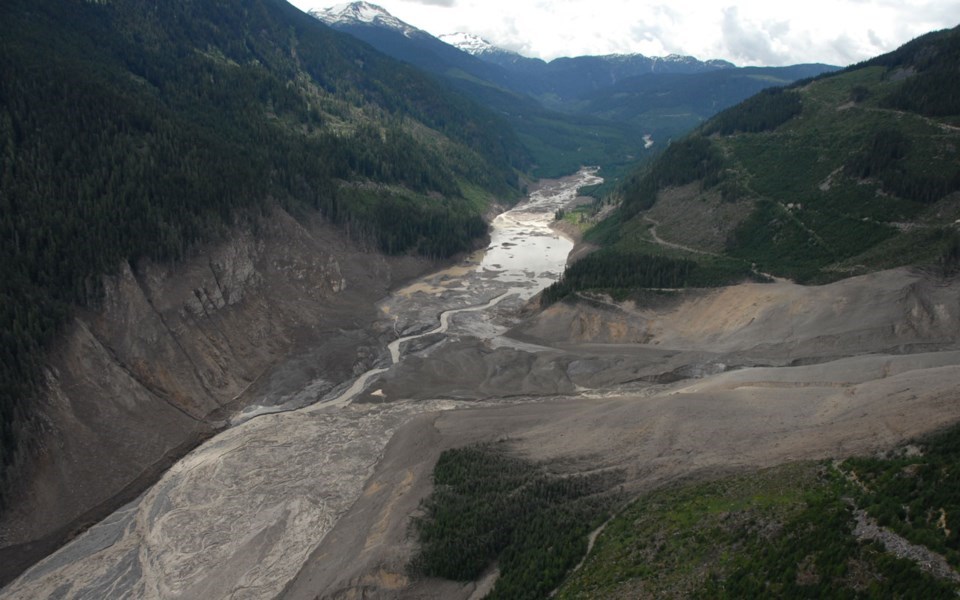Veronica Woodruff doesn’t want to cause you any more anxiety.
But she’s decided to forge ahead with hosting a virtual community engagement session called Impact of Cascading Natural Disasters on Sea-to-Sky Communities because it’s both fascinating for locals to learn about the wild natural landscape around them and it’s important to be prepared.
The Pemberton resident first started studying natural hazards in the Sea to Sky well before the COVID-19 pandemic uprooted everyone’s lives.
“People aren’t thinking about this day-to-day, but the fantastical nature of a massive earthquake or volcano [eruption] is like, ‘OK, I’m going to file that away and take note,’” Woodruff said. “The topic is engaging and the implications are broad.”
While Woodruff might be best known locally for her work with Stewardship Pemberton, she recently honed in on her interests in the natural world and decided to focus on landscapes.
That has shaped both her consulting work and led her to pursue a master’s degree at Royal Roads University, where she’s now studying the topic.
“I realized all this great research was happening on the ground, so I got in touch with the researchers and they were doing all this interesting work. Then looking at emergency preparedness from the local government perspective, they’re doing a ton of work,” said Woodruff.
The upcoming workshops will take place on Dec. 2 from 12:30 to 3:30 p.m. for Sea to Sky north (areas like Pemberton, Lil’wat Nation, and SLRD Area C) and on Dec. 3 from 9 a.m. to 12 p.m. for Sea to Sky south (Whistler, Squamish, SLRD Area D).
“They’re the same format, the same speakers, and risk events are essentially the same for all the communities in the Sea to Sky,” Woodruff said. “The reason I split them is I want to have a community dialogue. We have expert presentations I’m really looking forward to. Then it’s an opportunity for community dialogue.”
Expert presenters include local emergency managers, as well as Glyn Williams-Jones, co-director of the Centre for Natural Hazard Research at Simon Fraser University, and Steve Quane, an expert on volcanology from Quest University.
“Glyn, through the Centre for Natural Hazards Research, has a number of graduate students crawling up the hillsides here and [conducting] programs on monitoring [like the] mass instabilities on Mount Meager,” Woodruff said. “The technology they’re using is emergent technology to allow for real-time monitoring and it’s not extraordinarily expensive. They’re piloting that on a number of locations—Mount Currie, Garibaldi. He’ll talk about that in terms of what the innovations are now around research and monitoring risk.”
Quane, meanwhile, will be talking about the Geopark Project in Whistler.
“It’s a really exciting initiative,” Woodruff added. “What an excellent way to introduce natural hazard risk in an engaging way; look at this incredible landscape and the way it’s evolved.”
For her part, Woodruff has launched a survey for Sea to Sky locals to share more about their knowledge of natural disaster risk—from forest fires to earthquakes, landslides, floods and more—how prepared they are, and insight into how they might handle emergency situations like an evacuation.
“So far, people are taking the time to write comments, which will all be part of data analysis,” she said. “I really appreciate the level of information people have provided. I’m so pleased with the level of interest from the community and government and individual communities as well.”
While initially, a few registrations for the workshops were rolling in, it wasn’t until Woodruff checked in on completed surveys that she realized around 170 people had registered for the workshops at the end of the survey.
Because they plan to create smaller groups for discussion, Woodruff said they’re still able to accommodate more participants.
“Some people are emailing saying, ‘I’d like to participate, but I’m just a resident,’” she said. “Those are the kind of people I really want to engage with. Emergency planning has to involve the people who are going to be affected to make it effective.”
You can fill out the anonymous survey until Sunday, Nov. 29, at https://www.surveymonkey.com/r/N8C8C7J.
To sign up for the workshop, email [email protected].



